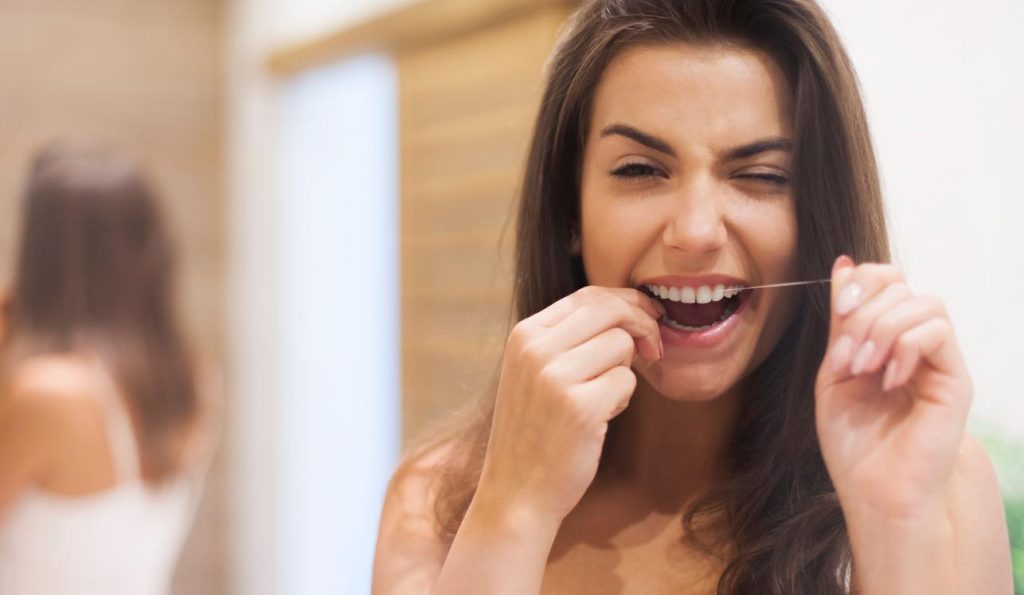Have you ever crawled into bed, all cozy and ready for sleep, only to remember you forgot to floss? That moment of debate hits: “Do I really need to get up, or can it wait until morning?” If you’ve been team morning-flosser (or team whenever-I-remember), you might want to reconsider your routine. As it turns out, that bedtime floss might be more crucial than you think.
The Overnight Bacteria Party You’re Not Invited To
Here’s something that might make your skin crawl: while you’re peacefully dreaming, your mouth becomes the perfect breeding ground for bacteria. During sleep, your saliva production dramatically decreases—by up to 90% compared to daytime levels. Without this natural cleaning mechanism working at full capacity, food particles left between your teeth become an all-night buffet for bacteria.
“Nighttime creates the perfect storm for dental problems,” says Dr. Sarah Chen, a dental hygienist with over 15 years of experience. “Less saliva means less protection, and those eight hours of sleep give bacteria uninterrupted time to do damage.”
Why Flossing Before Bed Makes Scientific Sense
When you floss before bedtime, you’re essentially removing the party snacks that bacteria would feast on overnight. This simple habit can make a huge difference in your oral health for several compelling reasons:
1. Saliva is Your Natural Defender (But Sleeps on the Job)
During the day, your saliva works overtime:
- Washing away food particles
- Neutralizing acids produced by bacteria
- Providing minerals that help repair early tooth decay
But at night? Your saliva glands basically clock out, leaving your teeth vulnerable to attack with minimal defense.
2. Time Matters in Bacteria Growth
Bacteria don’t just cause bad breath—they multiply exponentially. A single bacterium can become millions overnight if given the right conditions (warm, dark, moist mouth with plenty of food particles). By removing their food source before bed, you dramatically slow this growth.
3. The Acid Factor
When bacteria consume food particles (especially sugars and carbohydrates), they produce acids that eat away at tooth enamel. These acids can work for hours, and the longer they stay in contact with your teeth, the more damage they cause. An eight-hour sleep provides plenty of time for acid erosion if your teeth aren’t clean.
Beyond Cavity Prevention: The Whole-Body Benefits
The benefits of nighttime flossing extend beyond just preventing cavities. Research increasingly shows connections between oral health and overall health:
- Heart health: Several studies have found correlations between gum disease and increased risk of heart disease. Bacteria from infected gums can enter your bloodstream and contribute to arterial plaque.
- Inflammation reduction: Removing bacteria through flossing helps reduce inflammation in your gums, which may help reduce inflammation throughout your body.
- Better sleep: This might sound counterintuitive, but bacteria in your mouth can actually disrupt your sleep quality. A cleaner mouth means more restful sleep.
Making It a Habit: The Bedtime Ritual
The biggest challenge for most people isn’t understanding why bedtime flossing is important—it’s making it an unbreakable habit. Here are some practical tips to help:
Link It to Something You Already Do
Habit stacking is a powerful technique. Place your floss right next to your toothbrush or toothpaste as a visual reminder. Eventually, brushing without flossing will feel as incomplete as leaving the house without your phone.
Quality Over Speed
Effective flossing takes about 2-3 minutes when done properly. That’s not much time considering you spend approximately 480 minutes sleeping each night. Those few minutes protect your teeth during the other 477!
Try Different Tools
Traditional string floss isn’t your only option. Water flossers, floss picks, or interdental brushes might work better for your specific needs and preferences. The best flossing tool is the one you’ll actually use consistently.
Track Your Progress
Use a habit tracker or simply mark a calendar each day you floss before bed. Seeing your streak grow can be surprisingly motivating.
Morning Flossing: Still Better Than Nothing
If bedtime flossing truly doesn’t work with your routine despite your best efforts, morning flossing is still beneficial. However, consider this compromise: floss at night, and brush thoroughly both morning and night.
“I tell my patients that if they can only floss once a day, make it before bed,” says Dr. Chen. “But ideally, incorporating it into both morning and evening routines would provide maximum protection.”
Common Questions About Nighttime Flossing
“Should I floss before or after brushing at night?”
Dental professionals are somewhat divided on this question. Some research suggests flossing first removes interdental plaque, allowing fluoride from toothpaste to better reach between teeth. Others recommend brushing first to remove plaque, then flossing to clean between teeth, followed by a quick rinse.
The American Dental Association’s official stance? Either way is fine—just make sure you do both.
“Is it bad to floss right before bed and then eat a snack?”
In short: yes. If you floss and then eat, you’re essentially undoing much of the benefit. Try to make flossing the absolute last thing you do before sleep (after any nighttime snacks or drinks other than water).
“Can I just use mouthwash instead of flossing before bed?”
While mouthwash is a helpful addition to your oral care routine, it’s not a substitute for flossing. Mouthwash can’t physically remove food particles and plaque from between teeth—only flossing can do that effectively.
A Nighttime Investment in Your Health
Think of your bedtime flossing routine as a small investment with big returns. Those few minutes spent flossing before bed pay dividends in reduced dental bills, fewer uncomfortable dental procedures, and better overall health.
Your future self—with stronger teeth, healthier gums, fresher breath, and potentially fewer health problems—will thank you for making this simple change to your nighttime routine.
So tonight, before you turn out the light, reach for that floss. Your overnight mouth will be a much less hospitable place for bacteria, and you’ll wake up one day closer to optimal oral health.

Disclaimer: This article is intended for informational purposes only and does not constitute medical advice. The content is not intended to be a substitute for professional medical advice, diagnosis, or treatment. Always seek the advice of your dentist or other qualified health provider with any questions you may have regarding a medical condition or treatment.



